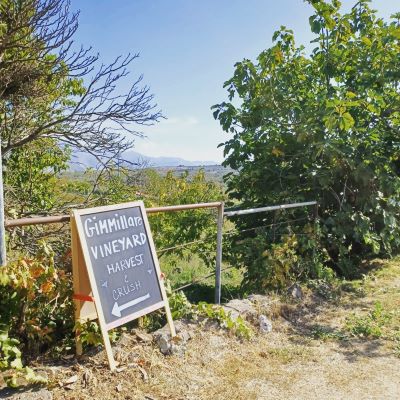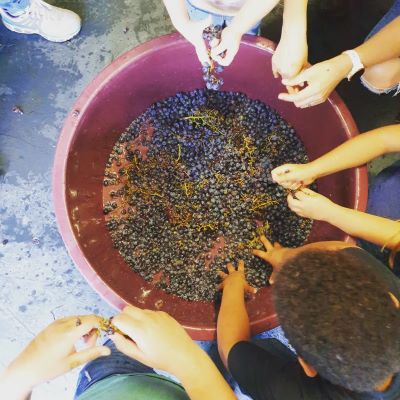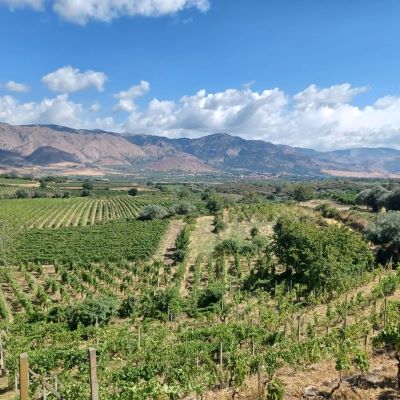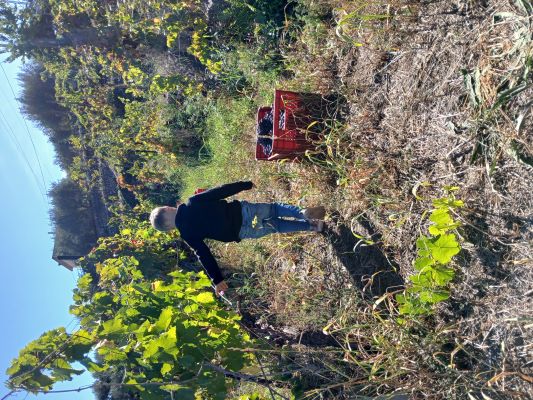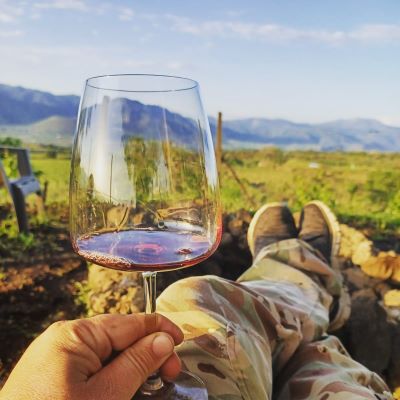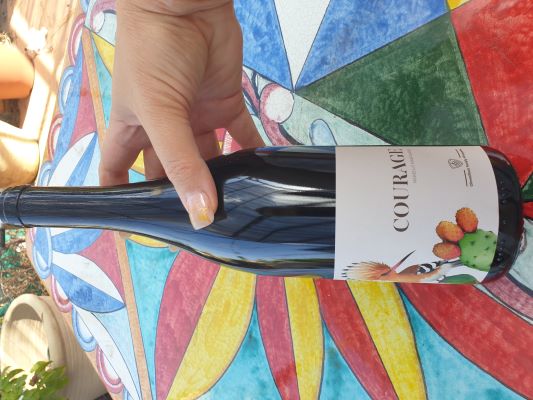Anthony Campanella spent four decades serving in some of America's most vital and sensitive roles, with tenures in the Marine Corps, the Defense Intelligence Agency, and the Department of Homeland Security. His work spanned intelligence analysis, crisis management, and international security cooperation, including deployments to active war zones. Yet no matter how far he traveled, he remained deeply rooted in his Sicilian heritage—something he says shaped his identity and perspective throughout his career. That connection has guided him to a quieter, more grounded chapter: an off-the-grid retirement as a self-described povero contadino (poor farmer) in rural Sicily.
He recently shared more about his professional and ancestral background, what inspired his move, his challenges, his favorite places in Sicily, and advice for those wishing to settle down on Italy's largest island.
Tell us more about your professional background.
It goes back 40 years after high school. I joined the Marine Corps and was an intelligence specialist, which is a precursor to coming here, because my last two years in the Marine Corps, I spent on a Navy ship in the middle of the Mediterranean. It was summertime—no wars, no conflicts. It was basically a Liberty Cruise, where we just visited 11 countries in the Mediterranean and enjoyed the heck out of it—great weather, great people, beaches, and food. The cost of living was cheap.
After the Marine Corps, I went back to college, finished my degree, and was hired by the Defense Intelligence Agency in their crisis management shop. We dealt with all current operations around the world, whether it was Haiti, Somalia, Iraq, or wherever there was a hotspot. We were the ones who provided national-level intelligence support to the warfighters.
I have deployed three times to "active" war zones. The first was for six months in support of Bosnia at the NATO Combined Air Operations Center in Vicenza, Italy. While my colleagues were being sent to places like Tuzla and Sarajevo, I was out of danger and safe and sound in the land of pizza and vino.
After that, I was given a Cuba assignment, which didn't amount to anything, so we never even made it to Cuba. We made it as far as Norfolk, Virginia.
The third one was in Brazzaville, Congo, because of a coup in Zaire. They thought we might need to evacuate the embassy staff and American citizens. But again, that fizzled out.
While I was in Brazzaville, I was selected to be the Defense Intelligence Agency (DIA) representative to the White House. So, I spent two years as a staff member of President Clinton's National Security Council in the White House Situation Room.
It was a 24-hour operation center monitoring worldwide events. You think you'll live the glory when you brief the president on a major event, but when something does happen, obviously, it's in the moment, and you don't have any answers and get yelled at.
Really, a great job. It was very exciting. The best two years of my life, I think, professionally.
After that, I left government service and went into consulting, working for the Joint Chiefs of Staff on September 11 in the Pentagon. When the plane came in, I was the luckiest man in America. I was on the opposite side of the building and didn't see, hear, feel, smell anything. So I was never, ever in danger. Just happened to be in the wrong place at the wrong time or the right place at the wrong time because I was on the opposite side of the building and had nothing there.
After that, the Department of Homeland Security was formed in response to the terrorist attacks. I went to work in the intelligence section for General Hughes, who used to be the director of DIA. He became the first assistant secretary for intelligence at DHS.
I helped them form what became the DHS intelligence apparatus. I did that for a few years, and then I left and went to do foreign military sales and security cooperation with foreign governments on behalf of the U.S. government. I traveled extensively in Europe and Asia to support the U.S. government in providing material solutions to foreign governments.
It was interesting for a kid from Everett, Massachusetts. I always have to reiterate: Never, at one point in my life, have I ever seen a shot fired in anger. Nor have I ever been in any kind of danger zone. I've been extremely lucky to have spent that long of a career in and around international crises, but never once has it touched me.

Anthony took his mother and aunt to Pietraperzia for the first time in 1997.
What is your connection to Sicily?
All four of my grandparents were born and raised in Sicily. My father's parents were from Messina, and they immigrated in 1906. My mother's parents are from Pietraperzia, which is in the dead geographic center of the island. I always say it has more sheep than people. My maternal grandfather came over in 1911, and my grandmother came over in 1913.
What inspired you to move to Sicily?
My grandparents romanticized the island: fig trees on every corner, apricots whenever you want them, and prickly pears by the dozens. This is true, but I also knew there was a reason they left, so I took it with a grain of salt.
I had never come as a kid or as a young adult. My first time here was in 1988, but it was only a short visit while I was in the Marine Corps. But I had spent a lot of time in the Mediterranean during the summer, so that was when I first started saying, "This is going to be a great place to retire."
It's a great launch point for any other place in Europe or Northern Africa if you want to travel and explore. But it was always kind of a pipe dream. Alfred Zappala of You, Me, and Sicily! used to own a little food store in Lawrence, Massachusetts, called All Things Sicilian. So, after I had gone home for some vacation, my mother and I took a ride up there to check out the shop.
There was a book, Many Beautiful Things, written by Vincent Schiavelli, an actor in Ghost, Fast Times at Ridgemont High, and Night Shift. He had made the transition from the States to retiring in Polizzi Generosa. The book was just so captivating, and he made it sound so seamless.
In hindsight, I probably should have said, "Of course, they all welcomed you, Vincent Schiavelli; you're a multimillionaire actor." But that was when I started to put it into motion.
Why not? I mean, I had basically lived away from my family since 1984. So it wasn't like I was living with my family on the street and then taking off and replanting myself. I was used to communicating via texts, phone calls, emails, and whatever it was, and seeing them once or twice a year for holidays and summer vacation. So it wasn't a major transition for me.
I said, "Now's the time. You're not getting any younger; enjoy your life—what's left of it."

Anthony moved to Sicily with just three bags.
What challenges did you face settling in Sicily?
First, I wanted to exercise my right to Italian citizenship, and that's a nightmare. Even when you follow the rules, it's a nightmare. Well, I didn't follow the rules because I had a top-secret security clearance with the government, and I couldn't apply for a foreign citizenship while the government was entrusting me with their precious secrets. They don't take it kindly if you're pledging allegiance to a foreign government when they provide you with this. So I had to wait until I retired.
I had two options. I could stay in the States for two years and go through the long process of getting my citizenship, but then I would be living in the U.S. with the U.S. cost of living, which would drain resources. Or I could come here and wing it, which is what I did.
It got done. And I'm legal. Everything's legal now. I pay my taxes, I do everything. The Carabinieri are not coming to the door.
The strange thing is that when you apply for citizenship, you do so at the city hall here at the Comune, which is unheard of in the States. You wouldn't just go to your city hall to apply for citizenship.
When I applied for citizenship, I went to the Stato Civile and they told me, "We can't accept your application because you don't have residency here. You need to go to the Anagrafe and get residency."
So I ran over to the Anagrafe and said, "Hey, I bought a house. I live here. I need to get my residency." They said, "OK, well, where's your long-term visa?" I was like, "Oh, I don't have one. I'm here on my tourist passport."
They said, "We can't give you residency. If you only have a tourist passport, you need to go to the Questura in Syracuse and apply for a long-term, elective residency visa. They'll give you your one-year elective residency visa, Signora Izzo will accept your application, and everybody goes home happy."
So I went up to the Questura and told them the story, and they said, "No, no, no, no, you don't need to do that at all. You go back and tell Signora Izzo to accept your paperwork because she will fill out a form as soon as she accepts it. It comes to us, and we give you your long-term visa because now you're awaiting adjudication."
So, basically, A told me to go to B, B told me to go to C, and C told me to go to A, and nobody was budging. We finally broke the logjam because the guys in the Anagrafe Office did me a solid favor, and I was able to obtain residency without the long-term visa.
It ended up working out. Two weeks later, I got my citizenship, and everybody went home happy, especially me, and probably Signora Izzo in the Comune, because I think she was sick of seeing my face.
I moved to Avola, Provincia di Siracusa. I had visited here three times before, in the 1990s, in 2011, and then again in 2015. My requirements were that I wanted to be 10 minutes from the beach and an hour from the airport.
This zone is beautiful. It's close enough to Syracuse, close enough to the airport, and right on the beach. So it met, checked off all the checkpoints, and I'm glad to be here.

Good Friday in Pietraperzia
Describe your lifestyle.
I call myself a povero contadino, a poor farmer in terms of both money and the quality of my stuff.
A British friend of mine here was renting from this woman who owned this farm up in the mountains. She said, "Hey, you know everybody. Can you come look at this place? She's trying to sell it. It's been in her family her whole life. She's 81 years old, and she can't care for it anymore. She has three kids and 10 grandkids, and they don't want it."
So I said, "Sure, I'll come up and look at it."
I went up to the mountains and saw the place. There is a house there, but the house is not supposed to be there. So they've kind of let it go astray. But it has a beautiful brick oven barbecue area, 120 trees, and about two acres of land where I can plant my fruits and vegetables in the ground.
I asked my friend, "Well, what is she asking for?" She said, "10,000." And I bought it right away.
The owner is now 86 years old, and whenever I collect anything from the trees —whether it's apricots, pears, peaches, figs, quince, or cherries —I always bring a big cestino, a large basket, to the woman. After all, I figured she's had this her whole life. She didn't want to sell it; she was forced because she couldn't keep up with it.
So I give her all that stuff, and she's very, very thankful all the time. But if I plant something in the ground—lettuce, zucchini, eggplant, or tomatoes—and I bring it down to her, she says, "Non voglio," I don't want it. And I'm like, "Why don't you want it?" She says, "Not mine."
The trees used to be hers, so she has an affinity for the trees, but if I put something in the ground, she doesn't want it. She'll accept the tree stuff because she knows that she's responsible for those trees being as productive as they are.
I was not looking for a farm. I was not looking for some land. I had no real desire, certainly no skill.
I keep learning every day, but I don't sell anything. I give everything away. I get about 135 liters of olive oil a year and just hand it out. I use that as tips to my barber, butcher, and folks who won't accept tips. And then I give the rest away to family, friends, and visitors.
I do the same with all the fruits and vegetables. I just give what I can't eat to my neighbors here. It's definitely not a money-making scheme!

Anthony practices a new farming technique.
How did you prepare yourself for this lifestyle?
I winged it. For somebody who, at work, is very fastidious in planning everything, I figured it out when I got here, and that's literally what I did.
I have one cousin who lives in Pietraperzia and speaks English and Sicilian fluently. He's been a godsend whenever I've needed assistance trying to meander through some kind of bureaucracy or vehicle issue or something like that. So he's been very, very helpful. So I did have a support system here—a support system of one, but that's really all I needed. And I had traveled to probably 60 or so countries before I moved here, so I think I'm very good at assimilating.
I wasn't worried about coming in and not having my Starbucks or my McDonald's. So that stuff was never a problem. The bureaucracy is the bureaucracy.
Citizenship was really the hardest thing. I had told people that I think the motto for Italian bureaucrats is, "As long as I've done nothing, I've done nothing wrong. So you can't tell me I messed up. I didn't do anything, so I didn't do anything wrong."
That was my biggest headache, because I'm a get-stuff-done kind of guy. But I just kept telling myself, "Hey, you're paying a euro a kilo for fruit. Settle down, suck it up, and go with the flow." Other than that, there were no transition problems whatsoever.
When I bought this house here, I technically didn't even know I had bought it. I had come here on a Friday night, and we looked at it with a realtor, and I made my offer. They said, "We have to talk to the owners." I said, "Sure, no problem."
We were leaving town 15 minutes later, and he called and said, "They accepted the offer. Can you come back on Monday to do the paperwork?" I said, "Sure."
I thought the paperwork was writing out the formal offer, but they tossed me the keys after I signed. I didn't even give anybody a penny.
So, even buying the house was simple. Obviously, no homeowner's inspection, no insurance. Because two days later, I called my cousin. I was like, "Filippo, we forgot to get insurance." He said, "What do you need insurance for?" I said, "I bought a house. What if it catches on fire?" He goes, "What's going to catch on fire?" I said, "Well, if somebody breaks in and steals something?" He goes, "You buy a new TV; what do you care?" I was like, "Well, what if somebody falls down my stairs?" He goes, "They fall down your stairs. Who cares?"
I've lived in this house for more than seven years and have never paid a penny in insurance, which is crazy to me, but that's the way it is.

What are your favorite places in Sicily and why?
I absolutely love Agrigento's Valley of the Temples. That's my favorite tourist spot. Other than that, I just love to go into the center of the country, go to Valguarnera Caropepe, or one of these small towns that have been abandoned by those who have had a mass exodus to the States, because it still has that look, that feel, that flavor of 1947.
Pietraperzia is a grand example. You go into the piazza in the daytime, and there are 200 men out there playing cards, drinking beers, and yelling at each other. They're there every single day.
There are no women; I'm not saying that's a good thing, but just that mentality that they're still in 1947. And I'll often ask my cousin's wife, "Why are there no women in town?" She goes, "Why would we want to go down there? That's where all the guys are." That's kind of their mentality.
There's a peace in that where there's no hustle and bustle. Being in D.C. for 30 years, that's a major transition. Obviously, I like Ortygia or Ragusa. I'm not a big fan of Taormina because I always tell people that it's not really Sicily. I'm not much of a fan of the big, big cities on the island. I just prefer a laid-back vibe.

A scene from the Pietraperzia Piazza
What advice do you have for those considering a move to Sicily?
First and foremost, be patient. Understand that you're a guest in this country. Even once you get your citizenship, you're still a guest here. Understand that, and then just understand the processes and work within those processes.
I try never to give advice. I tell people what happened to me. I won't give you advice because the definition of insanity is doing the same thing over and over again and expecting different results. That's the definition of normalcy here. You and I could do the exact same thing and have different results because you got a different clerk on a different day who is in a different mood. And so you can't say, "This is what I did, because you said you need these four documents," because they'll take those four documents and say, "Nope, you need two other documents." Or they'll say, "Why are you bringing me this stuff? I don't need it. I just need this one piece of paper."
For me personally, that's it. I would just ride the wave. It sounds weird, but what's going to happen is going to happen to you, and there's nothing that will prepare you for it. So, just have your Aperol spritz in the afternoon. Have a granita in the morning. If you're going to sit at the Questura for six hours, sit at the Questura for six hours.
Other than that, you just have to have the right mindset. You've got to be accepting of people and how they operate and work here. You have to have patience.
Just remember how lucky you are to be here. This is a beautiful, beautiful place.
If you enjoyed this article, consider subscribing to my newsletter for more content and updates!


